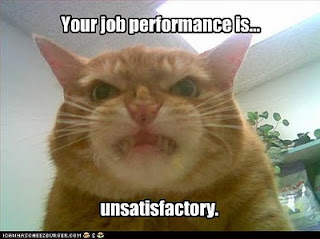We underwent that bizarre annual exercise in mutual misunderstanding at work recently, the performance review. Large Nameless Agency refers to it as the PMAP. It has multiple components, of course, some of which relate to the overall goals and standards of the agency as a whole and some of which are specific to an individual's job. The employee gets a score for each component (1-4, with 4 being the best), the scores are then averaged, and the resulting average determines whether a person is Exceptional, Fully Successful, Less Than Successful, or a Total Loser. Or something like that.
As sure as the proverbial swallows returning to Capistrano, the typical performance review results in the employee getting a couple of Exceptionals and a couple of Fully Successfuls, regardless of just how good or bad the employee actually was. I have never known anyone below a GS-13 who managed to score solid Exceptionals, just as I've rarely known anyone to be less than Fully Successful, although the latter does happen occasionally. There are Reasons -- one is that it's generally a lot easier to determine when someone is truly screwing up than it is to figure out that someone is consistently above average in every aspect of his or her work performance. (There's also the fact that if all you are is Fully Successful, there's a cap on how much of an end-of-year bonus a person can get. Exceptional employees can get the mega-awards; the Fully Successful might get a one day Time Off award, a hearty handshake, and, if they're really lucky, a cheap pen.)
Also as sure as the swallows returning, every employee spends a fair amount of time griping after the fact about their review being Wrong -- because every employee, no matter what their actual level of competence may be, is convinced that he or she is above average in some way. I, for example, am completely convinced that I am absolutely stellar at complying with arcane bureaucratic rules, like the protocols for naming and archiving files (being borderline obsessive-compulsive helps considerably). Thus, when my supervisor gave me a mere Fully Successful on the part of the evaluation that included that type of activity I was Seriously Annoyed. I came really close to actually insisting on an addendum to the review that would state, in effect, that I was the Queen of Electronic Files Organization, a move that would have no doubt succeeded in convinced my supervisor I was definitely OCD, and not just borderline.
I am told there was a time when the annual performance review consisted of basically a pass/fail grade -- you were either doing your job, or you weren't. In the latter case, you'd get stuck on an improvement plan to give you time to shape up (and the agency time to build the file they needed to fire you if you didn't) before the next review. To me that makes more sense, which is no doubt why they stopped doing it. And it could be worse -- when I worked for the Park Service, there were 5 levels.
Actually, what would make even more sense would be for my supervisor, the person who signs the forms indicating whether or not I'm doing a passable job, to drop by more often than once every six months so that maybe, just maybe, she'd have some clue as to just what it is I and my colleagues do. Due to some quirks of the organization and the fact supervising us isn't the only thing she does, our supervisor occupies office space on one of LNA's campuses while my colleagues and I toil quietly away in a building in an office park 5 miles distant. She sees the final product (so does the whole world, for that matter), but she doesn't see the day-to-day behaviors, the interactions at editors' meetings (she doesn't attend, even by telephone, which has struck me as odd since I started with the journal 9 months ago), who's showing up on time and who's getting there late and leaving early. . . which, now that I think about it, is probably just as well. Given a choice between extremely hands-off management and the potential for micromanagement, I'll take the former every time.

I always thought that if you came in late, you leave early to make up for it.
ReplyDeleteOne of the best things about working for myself is, no more stupid performance reviews.
ReplyDeleteAlthough I have to say, I think I'm probably harder on myself than my bosses ever were.
The thing I always found frustrating about the reviews wasn't being told I needed to improve in some area or other. It was, as you noted, the disconnect. Ofteh, the things I actually did really well were the things I was told to improve, while things I knew needed work wer rated "exceptional." The bosses never really had a clue.
So nice not to deal with that any longer....